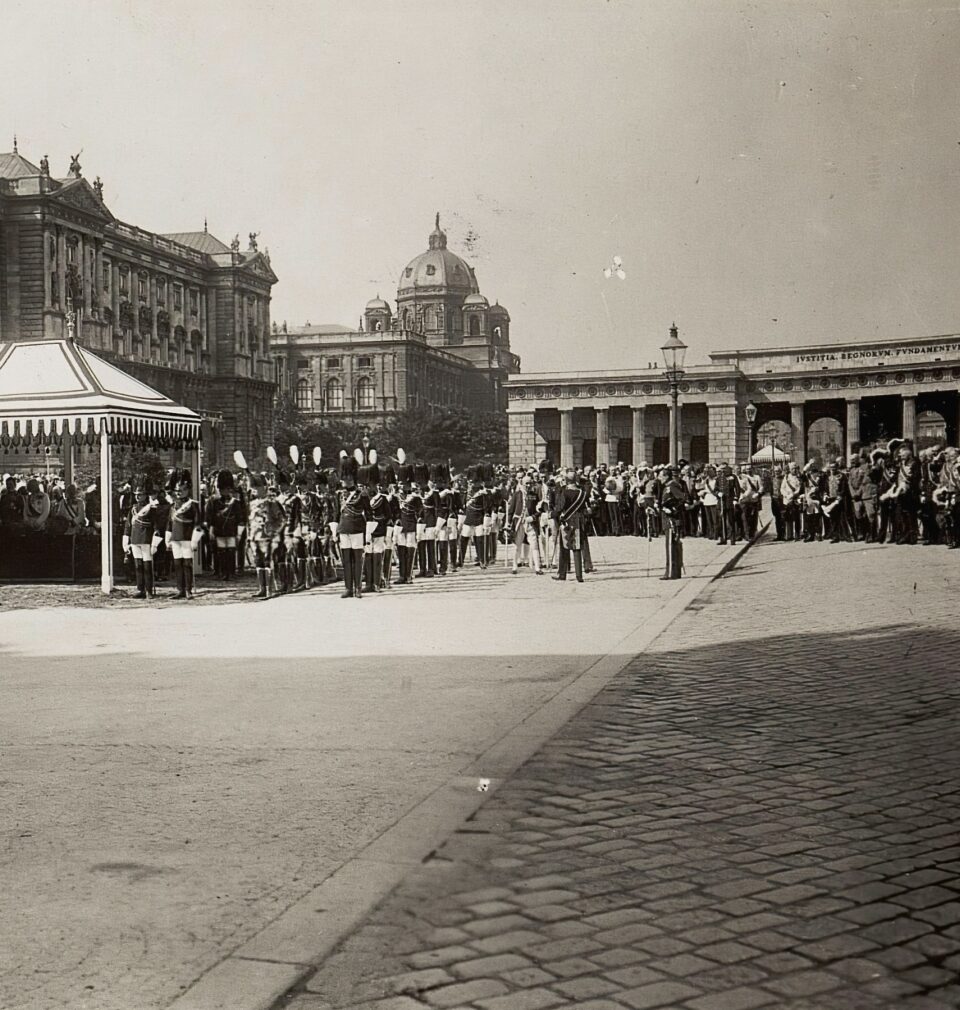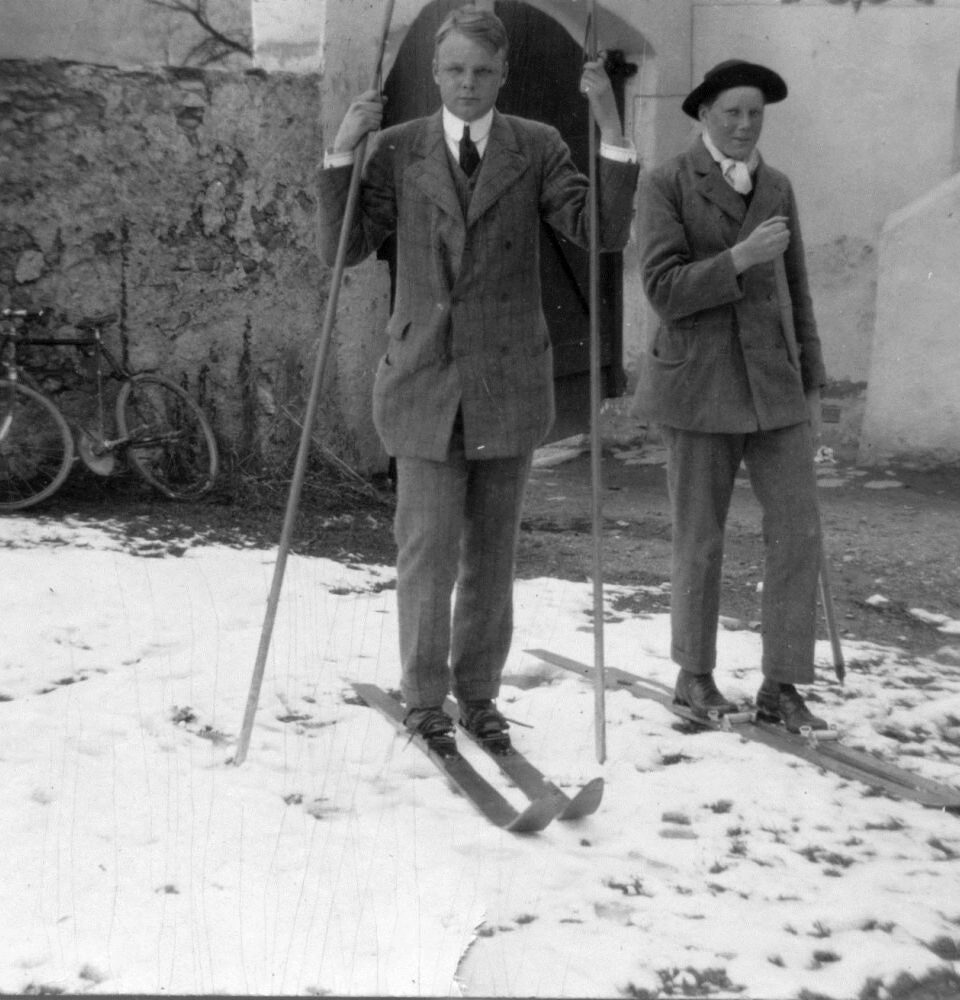
Austria
In the long breath of history
Publication: 6 March 2023
TAGS FOR THE ARTICLE
TO THE LIST OF ARTICLESThe history of the Republic of Austria moves in the political field between war and peace, between repressions and social and cultural awakenings, between recession and long lasting economic and social progress.
“The sun flies ahead of the hurricane to the west. Two thousand years are up and nothing will be letf to us”[1], wrote Ingeborg Bachmann in the poem “Great Landscape near Vienna“ – she lets there the long breath of history blow over the city.
A hundred years, measured by the long breath of history, has lasted just long enough to develop in people the ability to remember, to cross in their minds time and place thresholds. State anniversaries make us stop for a while and look straight into the future. It is a very liberating, solemn, but also painful moment in which some achievements, successes, but also political aberrations come to the light.
But how does collective history become visible, vivid, when there are almost unmanageable people’s stories?
The long breath of history is primarily and noticeably present in family memories. A hundred years are barely three generations that experience has shown to come physically close and spend certain time of their lives together, passing the stories on from one to the other or from mouth to mouth.
My generation’s memory begins with the collapse of the imperial-royal monarchy and the emergence of the Republic of Austria. At the age of eighteen my grandfather took part in the last Isonzo offensive in October 1917 and was wounded as a soldier in the Imperial and Royal Army on the Piave. When he recovered and was finally able to get back home, there was the republic proclaimed.
My grandmother claimed to have survived three wars, the First World War, the Carinthian defensive battle and the Second World War. Her delicate figure, which was all the time influenced by the memories of her eventful history and of the Ravensbrück concentration camp, moved imperceptibly, but are still present in her thoughts and feelings.
As soon as we turn our gaze from our origins and try to understand history in general, it appears to us fleeting, in fact almost intangible. A collection of traces, relicts, as a warning sign on the wall, as an opaque, cultural, material mixture that we can barely get through in our thoughts. In the moments of happiness we believe we see something shimmering through the depths of historical time, for example questions that are burning and affect us as if they were just being brought up.
I was invited to give a speech at this event. An amazing, valiant invitation that is a great honour for me, but which has also thrown me into an inexorable cycle of doubt. For a long time I was busy trying to figure out what position I could speak from. I can speak neither on behalf of any party nor on behalf of any institution or group of people. The best choice was to speak as an individual, using my own life story, as a poet, Carinthian Slovenian, Austrian who has a relationship with the Republic of Austria. Having a connection doesn’t mean only going through state educational institutions or paying taxes, it also means getting involved, getting involved and participating in political building processes. This connection isn’t about benefits or security, it’s really about looking for your identity, searching for your roots, for who you are and who you want to be in the future.
Identity as I understand it is a process, not a closed state, not a fixed, unchangeable quantity. It doesn’t begin and end in the present times, but is hidden in the tradition, it depends on the language, inheritance, the things we learned, experienced and survived, it depends on work, suffering, faith, love, hope, on forgetting and remembering, on our fears and longings, on what we were, what we are and what we want to be.
As soon as identity is hardened, narrowed down or dictated from outside, it turns into a keyword, a reproach or a mask. Identity is based on ties, and ties can be life-affirming or destructive. State structures are also subject to the processes of finding identity and implementing changes. The relationship between the individual and the state moves between these contexts.
The decisive criterion is at the beginning of this unusual relationship. It is the touchstone of democracy. The Democracy is an organization of law, participation in social and political processes. It thrives on balance, disputes, arguments, corrections and the freedom of the individual. The authoritarian state, on the other hand, harasses the weaker, the other, prevents the possibility of contradiction, free will, political participation, power control, and change. The democracy is, in order to uphold family relations, the antimodel to the authoritarian family, at the head of which usually a patriarch rules, who decides about the situation of all the family members.
The history of the Republic of Austria moves in the political field between war and peace, between repressions and social and cultural awakenings, between recession and long lasting economic and social progress.
The First Republic of Austria came into being as a democratic draft after the collapse of an old monarchical order. The rising political forces wanted to change the trauma of collapse and war into a dream of progress. But the loss of the traditional values, coupled with a dramatic economic crisis, weighed too heavily. The young parliamentary democracy had to face all the shadows of the past, fears and authoritarian traditions. In the memory of generations there is the First Republic stored as an epoch of quarrels connected with the loss of the powerful father. Already in the 19th century people, who had been influenced by the industrialization and increased mobility, have seen themselves taken away from the contexts of their traditional life. After the destructive war, the feeling of abandonment must have prevailed. What I believe is still perceptible nowadays, in addition to the presence of diverse cultural and historical statues and monuments, is the melancholy tone of the loss of one’s homeland. This feeling of loss has shaped the Austrian folk culture. All the things that have been lost are idealized, not only in the country regions of Austria, in a beauty that has perhaps never been seen before. That is the image of the past idyll that is gone for good, although underneath all injuries and humiliations have remained hidden.
Passing away of the old world could be universal suffrage, which also included women for the first time, their struggle for fair wages, the introduction of the eight-hour working day and the social democratic movement could hardly outweigh it. The old times influenced the growth of anti-Seminist moods; it was the confrontation of the longing for a strong man and in the coming ahead the national questions. At first the First Republic tried to prevent all multilingual cultural references to the former crown lands. The demand to resign of their language and culture was felt above all by the Carinthian Slovenes.
Looking back you could say that most Austrians in the First Republic wanted nothing more than to become German. But the price for those efforts was very high.
Austrian democracy quickly changed into an authoritarian state, into civil war and ultimately into the Nazi dictatorship. The remnants of a multilingual, multi-religious, democratic reality were almost completely destroyed after the annexation to Hitler Germany with terror, violence and war. It is said that Austria has disappeared from the map for years, but the Austrians have been on all sides of the war front, including the apocalyptic murders in occupied Eastern Europe. The question of how could it happen at all still fills us with horror today.
If we look back at who fought for Austria during the Nazi time, we can see, that those were only individuals. The resistance that made the re-establishment of a free Austria possible was organized in the first place and in groups, but in most cases those were also individual. This fact throws a special light on the scope and importance of the ethically acting individuals. The Austrian resistance was born in people who hadn’t thrown their humanity overboard during the period of organized violence and total propaganda. It is a compound of done almost every day helping courageous gestures that resisted destruction and the organized malevolence against people. Democracy as we know was given to us not only thanks to this moral courage and because of the many sacrifices that the Nazi regime demanded. We owe it to political fortunes and the negotiating skills of individuals.
At this point I would like to remind you of a loss that is often ignored on official occasions, the loss of a generation of Austrian writers and artists who were expelled, deprived of their existence, driven to suicide or killed in the Nazi time. Their work still show its look at the land that they didn’t want. The historical events are shown in their literature, images and longings from the world of yesterday, which is so close to the world of today and still so distant.
I believe we need to trust the deep shock of all survivors after the catastrophe of World War II, which was summarized in the phrase Never again. If we don’t, we will for sure repeat all the political mistakes. From this inner certainty of the survivors there was the corn of human rights formulated and the idea of a common Europe was born. These achievements point the way ahead for the future, as a promise and a task to be completed.
The success of the Second Republic of Austria was founded on the State Treaty, its neutrality, the economic upswing and the social partnership, which is currently much maligned. The Austrians developed the identity that we associate today with the world Austria. In our time there are decisive educational, legal, structural and institutional modernizations that have affected the whole country and have reached all citizens. We were lucky to have experienced a market economy organized by the welfare state, a tamed capitalism that enabled the population to have a huge share in its successes. The legal equality and emancipation of women broke up the millennia-long prerogative of men. Implementing equality in daily life has come and is stagnant. The republic also had its problems with the implementation of the rights of the Austrian ethnic groups enshrined in the State Treaty. This had a lot to do with the continued effect of German nationalist traditions with which it didn’t want to confront.
After losing their predecessors, the writers and the artists, with persistence and gentle force, as Peter Handke has once summed it up, denied the image of the country, which constantly wanted to take refuge in the idyll, in oblivion. With their work, which was often met with incomprehension, they’ve helped to maintain Austria’s self-critical balance. By joining the European Union, we made a ground-breaking decision, almost like a dream and we are still afraid of our courage. The globalization of the markets, combined with the advancing digitization, the fight against the destruction and littering of our planet require international political cooperation. In the course of integration into a multilingual Europe, Austria has also found its multilingual roots and recognized them as part of its own being.
However, since our accession to the European Union, the political ground on which we are standing, hasn’t come to rest. We feel that we have entered a process of change that is like a slowly swelling hurricane. We still have little time to get used to the expanded possibilities for political decision-making in Europe, although we are pleased to see how that political Europe is gaining its new shape. We have just sat up with the achievements of the welfare state, and we are already being told that we should finally grow up and take care of ourselves. But who grumbles in the background of the state, the old, overpowering father or some other power, with invisible, regulating hands and an invisible face?
What is hidden behind all the efforts to run the state as a company? Is it the idea that states are cut off from their function as community organizations and thrown onto the free market? Do the states compete with each another feeling they have to find their place on the state market like in the supermarket, in which one advertises for global investors with bargains, beauty, health, freshness and cheap, willing human capital? This requires a transformed understanding of politics, which is organized basing on the criteria of competition and according to rules of the all-round selection.
The winners and losers are produced and social actions is subjected to the struggle mode of the global economy. A policy that aims to turn citizens into optimized people for the competition and that grades, weighs and evaluates everything we do. With algorithms, of course, because invisible algorithms mean more than arguments, more than a particular person with an individual story.
A considerable part of the spreading uncertainty has its roots in the fear that one could disappear from the public perception and custody as an error-prone, sick, old person who is unproductive for the economy. Even if nationalist parties across Europe believe that they can offer insecure citizens national affiliation as a domicile and substitute for the broken public spirit, the crisis goes deeper. It is less tangible, but more fundamental than the upheaval at the beginning of the 20th century. It destroys the feeling of belonging and responsibility, it changes the enlightened image of man, it interferes with the genetic potential of the human being as a relational being so that it finally becomes an economic person who acts according to the criteria of its own advantage. Last but not least, the new economy could do almost without people and without states.
The long breath of history has become thin and barely noticeable. We don’t listen because we can’t trust the language. Above all, the political language that is being dressed up for the media like a box of chocolate. All the messages that are given to us are wrapped in a glossy paper, but the filling under the chocolate layer may taste bitter. We don’t know and don’t have time to have a close look what is the aim of the language and politics, whom those should reach and whom they finally hit.
We have enough to do with opening other beautifully wrapped fortune cookies that ultimately turn out to be cheap dummies. We try to keep up with the persuasiveness of the motivational language, which comes down on us from almost all channels just like confetti. To achieve this, we let off steam on social media and show that we have understood the language of these times. We have gained the fine art of insult, humiliation, condescension, deception, we have internalized the rules of this game and we can find ourselves when we are criticized. We are fine, but the signs of these times point to a storm.
Our countries are still being confronted with some huge new challenges by digital corporations. The digital giants have given us with their technologies, but have also drawn into our lives a previously unimaginable level of power that we cannot control and we can barely shape. Our searches are caught in the noose they put us in the net and we are about to lose control of our actions. If we allow our lives and our bodies, even under the time pressure, to be economized down to the last fibre, if we agree to turn our longings, feelings and fantasies into a measurable value, a commodity, we have the idea of ourselves as ethically acting, finally abandoned social individuals.
The ethically acting individual, however, is the core, the crucial point of every democracy.
Last but not the least, the democracy is the only form of rule that includes the other and the minorities, and would be the only form capable of including people who come to us from other countries and traditions for different motives, namely as jointly responsible for the community and the values of democracy. Only by being attached to the country and its democratic values you could break open the diverse parallel societies and help all those involved to resolve and endure conflicts.
With regard to refugees, for whom the Mediterranean has become a dead zone, with regard to the destruction of our environment, in view of totalitarian power fantasies that are gaining in assertiveness through technical development, the questions of the future will be of a humane and ecological nature. We’ll have to defend human rights and peace against the destructive potential of all-round mobilization. We’ll break free from the tightness of the moment, which we’d like to inflate to an eternity with the help of technology, and step into the real time. With an ear sharp for the fall[2], as Ingeborg Bachmann wrote in her poem, we will come to our true, vulnerable form disenchanted through analyses and numbers. The Austrian painter Oskar Kokoschka paraphrased the necessity of democracy with the sentence: Democracy must lead as safely as an instinct. I wish us and the still young Republic of Austria for our birthday this instinct for democracy in a United Europe.
The text is a transcript of Maja Haderlap’s speech delivered on November 12, 2018 at the Vienna State Opera on the occasion of the 100th anniversary of the republic.
Translated from the German by Justyna Sarna
[1] “In the storm of roses. Selected poems by Ingeborg Bachmann, translated, edited and introduced by Mark Anderson”, Prinston University Press, 1986, p. 75.
[2] P. 77
Similar articles
Copyright © Herito 2020


